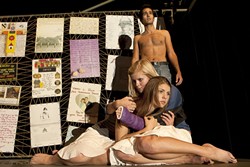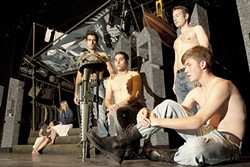
- PHOTOS BY STEVE E. MILLER
- ENDURE, I HOPE : Antigone, played by Ellen Jones, and sister Isthmene (Ellie Kovara) appear in a daring adaptation of Sophocles’ play.
Based on Sophocles’ play Antigone, Letters inter-splices the classic Greek tragedy with letters written to lost soldiers, delivered by the cast as monologues at specific moments throughout the play.
The adaptation is a risk, but a highly conceived and chronologically appropriate one, opening by happenstance on Veteran’s Day.
As the play begins, an ensemble narrates the history of Eteocles and Polyneices, using American Sign Language to emphasize key words. Eteocles and Polyneices were the sons of King Oedipus and the “undisputed mark of brotherhood” within the city of Thebes. When Oedipus realized his famous transgression, plucked out his eyes, and renounced the crown, his elder son Polyneices became king. But Eteocles overthrew his brother, sending him into exile, where he gathered an army of outcasts together and marched on Thebes.
Here the time and place shifts. A soldier recounts his brush with death in Vietnam in August of 1968. As it was his 21st birthday, his fellow soldier Henry Bradshaw generously took over his post for the night. As the narrator slept, the Viet Cong surrounded the camp. Bradshaw was the first killed, though not before diverting a grenade from the bunker, which could have killed everyone inside. “Henry died for me that night,” concludes the narrator.
But before there’s a moment to reflect, we’re whisked back to Thebes, where, after seven years of bloodshed, the two brothers meet alone on the battlefield. In a stylized struggle, Eteocles and Polyneices destroy one another, ending their gory feud. This is where the story of Antigone really starts.
Eteocles’ successor, King Creon (played by Ryan Austin), declaring Polyneices a betrayer to his homeland, decrees that his body should not be buried. When Polyneices’ sister Antigone (a sharp Ellen Jones) admits to burying her brother under cover of darkness, she’s sentenced to death, leading to ongoing strife between her fiancé, Haemon (Torin Lusebrink), and his father, King Creon.
The adaptation was a good idea, but the devoted cast sees it through into a successful, poignant production. Jones, with her intense gaze, plays a frightening Antigone. Todd Andoli stands out as the wizened Teiresias, who bravely stands up to Creon’s decree that burying Polyneices is punishable by death. Ensemble members Jaide Whitman and Jack Adams each volunteered to pen songs for the production; they play The Wall and After the Fight acoustically.

- PHOTO BY STEVE E. MILLER
- AFTER THE FIGHT : Alternating between the worlds of Thebes and Vietnam, Al Schnupp’s Antigone and Letters to Soldiers Lost explores the aftermath of war and the way humans across centuries have dealt with grief and loss.
Director Schnupp had already spent a great deal of time reading letters from the Vietnam Veteran’s Memorial, published in the books Letters on the Wall, Offerings at the Wall, and Shrapnel in the Heart. In a Script Analysis course, he began teaching Antigone, and, he said, “somehow the link was made.” Both Antigone and the approximately 400 letters Schnupp read concerned “the aftermath of war, how the survivors deal with the dead, and they just seemed to mesh.”
Matching the “spirit of the letter with the spirit of the play” was a project lasting about a year, but one Schnupp says he greatly enjoyed. And the similarities are undeniably present. In the wake of loss, a soldier writes “I will go on,” echoing Antigone’s resolve to “Endure, I hope, until the end.”
Copies of letters to lost soldiers adorn the rear wall, and their looping scrawl, enlarged a hundred times over, is printed on the costumes.
A series of columns, growing taller at the middle (a deliberate inversion of the Vietnam War Memorial), contains displays combining the two eras: an urn here, a dog tag or combat boot there.
- A SPIRIT HOUSE: Antigone and Letters to Soldiers Lost opens at Cal Poly’s Spanos Theatre on Nov. 11 at 8 p.m. The production runs the weekends of Nov. 11 and 18. General admission is $15; student and seniors pay $12. For reservations, call 756-2787 or visit pacslo.org.
In fact, everyone involved in the production seems humbled by its raw, emotionally charged material. Halfway through our interview about his adaptation, Schnupp paused.
“I don’t know how to say this without sounding weird,” he began.
“Just go ahead,” this writer urged.
“Well, there are times when it feels holy to me.”
Arts Editor Anna Weltner will be buried under a mound of newspapers. Contact her at [email protected].
Comments